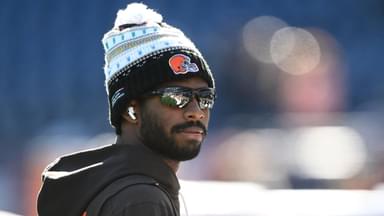It didn’t take long for the toxic racial discourse surrounding the WNBA’s two most marketable stars, Caitlin Clark and Angel Reese, to resurface online. The pair faced off in the season opener, with Clark’s Indiana Fever dominating Reese’s Chicago Sky in a 93–58 win. However, the main story after the game was a hard foul Clark laid on Reese, which resulted in quite the overreaction from the Sky forward. Naturally, everyone had to chime in — including NFL pundits Robert Griffin III and Ryan Clark.
Advertisement
RGIII got it started by posting a video of himself lambasting Reese. Basically, he made the argument that Reese hates Caitlin Clark as a person. Ryan Clark responded to that video, saying that RGIII should not be going after Reese’s character.
He also noted that RGIII’s marriage to a white woman meant he wasn’t having the same conversations at home about how Black women like Angel Reese are depicted in the media and how that affects their real lives.
Griffin, predictably, took massive offense to Clark’s rebuttal, arguing that families should never be brought into sports debates. Well, in that case, it’s worth noting that in RGIII’s original video—in which he questions the character of a Black woman—his white wife is seen in the background, listening and snapping in agreement with what he said.
Later, Clark once again continued his argument, though he did acknowledge that he hadn’t approached the issue properly the first time.
“Instead of pointing to what non-Black women can’t do, or don’t do, or the conversations I don’t feel like they can have. I should’ve pointed to what having a positive Black woman in the household, could do,” Clark said in the latest episode of The Pivot.
“I think back to Alexis Ohanian when he was on our show. He talked about being married to Serena Williams and the things that he has learned through not only the conversations they’ve had, but through the life they’ve experienced,” Clark added.
Serena Williams and Alexis Ohanian were married and had their first child, Alexis Olympia, in 2017. However, after giving birth, the deep-rooted racism in American society reared its ugly head again. Even for someone as rich and famous as Serena Williams.
“He brought us back to childbirth, many of us know how high the mortality rates are in this country for Black women. But clearly, that wouldn’t extend to Serena Williams. That wouldn’t also include one of the world’s greatest athletes of all time. But it did. And it taught him a lesson. And I feel like those lessons are invaluable,” Clark continued.
There’s no debating it: non-white women have a much harder time giving birth in America. KFF reported in October of last year that pregnancy-related mortality rates of Native American women and Black women were over three times higher than the rates for white women.
The numbers are staggering. There are an average of 63.4 deaths per 100,000 among Native Americans and 55.9 among Black women. The number is just 18.1 for white women. Ohanian, a white man, said that Williams had to self-diagnose herself with a pulmonary embolism after the birth because the nurses were brushing her off.
“And so I’m there, in the hospital room, it was supposed to be the best moment of our lives. Our daughter was born happy, healthy, great. And Serena’s not feeling right, and she’s trying to convince these nurses. Like, ‘Hey, something’s not right, I think I might have a P.E.’ And the nurses aren’t taking her seriously,” Ohanian previously told Clark.
One would think that Serena Williams’ status as a world-famous athlete would have exempted her from the ingrained racism in America’s health care system. But alas, even the nurses who helped deliver her baby couldn’t escape their subconscious biases.
These are the kinds of stories and conversations that Clark believes would help someone like RGIII to better understand the plight of Black women like Angel Reese and the preconceived prejudices they must deal with.








